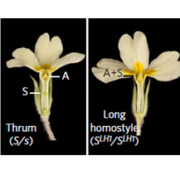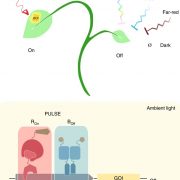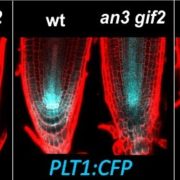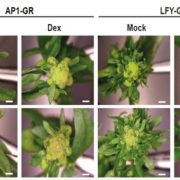Distinct characteristics of genes associated with phenome-wide variation in maize (Zea mays) (bioRxiv)
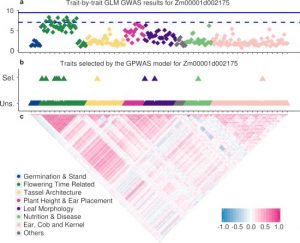 High-throughput plant phenotyping is growing rapidly and enables the collection of dozens or hundreds of traits of the same plant genotype efficiently. The development of this technology expands the diversity of plant phenotypes and brings an opportunity for reexamining the connections between genotype and phenotype from a novel perspective. The widely adopted genome-wide association study (GWAS) provides meaningful evidence for gene function exploration. In this study, the authors proposed a Genome-Phenome Wide Association Study (GPWAS) model that couples hundreds of commonly accepted agronomic traits to explain variants in the gene level of maize. Based on gene features from evolution, expression, structure variation and gene annotation, genes identified by GPWAS tends to have closer distance with classical maize mutants than genes in background or identified by conventional GWAS models. This study shows the potential for utilizing high-dimensional phenotypes in identifying desirably functional candidates from a large number of annotated genes. (Summary by Zhikai Liang) bioRxiv: 10.1101/534503v2
High-throughput plant phenotyping is growing rapidly and enables the collection of dozens or hundreds of traits of the same plant genotype efficiently. The development of this technology expands the diversity of plant phenotypes and brings an opportunity for reexamining the connections between genotype and phenotype from a novel perspective. The widely adopted genome-wide association study (GWAS) provides meaningful evidence for gene function exploration. In this study, the authors proposed a Genome-Phenome Wide Association Study (GPWAS) model that couples hundreds of commonly accepted agronomic traits to explain variants in the gene level of maize. Based on gene features from evolution, expression, structure variation and gene annotation, genes identified by GPWAS tends to have closer distance with classical maize mutants than genes in background or identified by conventional GWAS models. This study shows the potential for utilizing high-dimensional phenotypes in identifying desirably functional candidates from a large number of annotated genes. (Summary by Zhikai Liang) bioRxiv: 10.1101/534503v2



